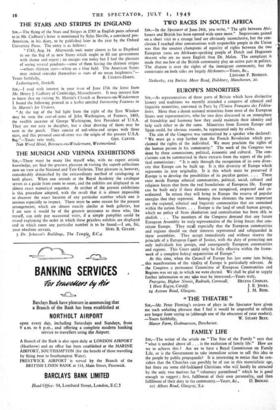EUROPE'S MINORITIES
Sta,—As representatives of three parts of Britain which have distinctive history and traditions we recently attended a congress of ethnical and linguistic minorities, convened in Paris by l'Union Francaise des Federa- hues. More than a dozen national minorities from most of the European States sent representatives, who for two days discussed in an atmosphere of friendship and harmony how they could maintain their identity and help each other to do the same. Minorities from Eastern Europe and Spain could, for obvious reasons, be represented only by exiles.
The aim of the Congress was summarised by a speaker who declared: " We must go a step further than the French Revolution which pro- claimed the rights of the individual. We must proclaim the rights of the human person in his community.", The work of the Congress was done by three commissions, political, economic and cultural. The con- clusions can be summarised in these extracts from the report of the poli- tical commission : " It is only through the recognition of its own diver- sity that Europe can be built up. It is this diversity of Europe which represents its true originality. It is this which must be preserved if Europe is to develop the possibilities of its peculiar genius. . . . There exist inside Europe ethnical communities, political, social, cultural and religious forces that form the real foundations of European life. Europe can be built only if these elements are recognised, respected and co- ordinated. In return they will bring to Europe the reserve of popular energies that they represent. Among these elements the most important are the regional, ethnical and linguistic communities that are contained within the nation States. . . • Europe is the land of small human groups, which no policy of State absolutism and centralisation has been able to abolish. . . . The members of the Congress demand that any future European Assembly be truly representative of the living forces that con- stitute Europe. They recall especially that the European communities and regions should see their interests represented and safeguarded in these assemblies. They accept immediately and without reserve the principle of a European C9urt of Justice, with the duty of protecting not only individuals but groups, and consequently European communities and regions. This Court could only be fully effective within the frame- work of a complete federal organisation of Europe."
At this time, when the Council of Europe has just come into being,
_ this manifestation of the vitality of Europe is particularly relevant. At the Congress a permanent Committee of European Communities and Regions was set up, to which we were elected. We shall be glad to supply further information to any who may be interested.—Yours truly, Prasygow, Higher Ninnis, Redruth, Cornwall. HELENA CHARLES.
1 Heot Esgyn, Cardiff. J. E. JONES.
24 Aytoun Road, Glasgow. J. M. Rem.






































 Previous page
Previous page